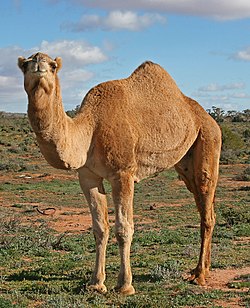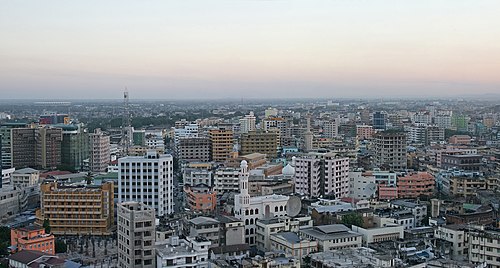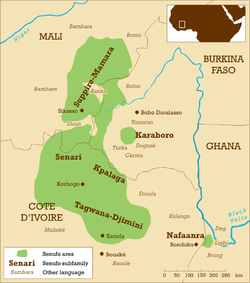Portal:Africa



Africa is the world's second-largest and second-most populous continent after Asia. At about 30.3 million km2 (11.7 million square miles) including adjacent islands, it covers 20% of Earth's land area and 6% of its total surface area. With nearly 1.4 billion people as of 2021, it accounts for about 18% of the world's human population. Africa's population is the youngest among all the continents; the median age in 2012 was 19.7, when the worldwide median age was 30.4. Based on 2024 projections, Africa's population will exceed 3.8 billion people by 2100. Africa is the least wealthy inhabited continent per capita and second-least wealthy by total wealth, ahead of Oceania. Scholars have attributed this to different factors including geography, climate, corruption, colonialism, the Cold War, and neocolonialism. Despite this low concentration of wealth, recent economic expansion and a large and young population make Africa an important economic market in the broader global context, and Africa has a large quantity of natural resources.
Africa is highly biodiverse; it is the continent with the largest number of megafauna species, as it was least affected by the extinction of the Pleistocene megafauna. However, Africa is also heavily affected by a wide range of environmental issues, including desertification, deforestation, water scarcity, and pollution. These entrenched environmental concerns are expected to worsen as climate change impacts Africa. The UN Intergovernmental Panel on Climate Change has identified Africa as the continent most vulnerable to climate change.
The history of Africa is long, complex, and varied, and has often been under-appreciated by the global historical community. In African societies the oral word is revered, and they have generally recorded their history via oral tradition, which has led anthropologists to term them "oral civilisations", contrasted with "literate civilisations" which pride the written word. African culture is rich and diverse both within and between the continent's regions, encompassing art, cuisine, music and dance, religion, and dress.
Africa, particularly Eastern Africa, is widely accepted to be the place of origin of humans and the Hominidae clade, also known as the great apes. The earliest hominids and their ancestors have been dated to around 7 million years ago, and Homo sapiens (modern human) are believed to have originated in Africa 350,000 to 260,000 years ago. In the 4th and 3rd millennia BCE Ancient Egypt, Kerma, Punt, and the Tichitt Tradition emerged in North, East and West Africa, while from 3000 BCE to 500 CE the Bantu expansion swept from modern-day Cameroon through Central, East, and Southern Africa, displacing or absorbing groups such as the Khoisan and Pygmies. Some African empires include Wagadu, Mali, Songhai, Sokoto, Ife, Benin, Asante, the Fatimids, Almoravids, Almohads, Ayyubids, Mamluks, Kongo, Mwene Muji, Luba, Lunda, Kitara, Aksum, Ethiopia, Adal, Ajuran, Kilwa, Sakalava, Imerina, Maravi, Mutapa, Rozvi, Mthwakazi, and Zulu. Despite the predominance of states, many societies were heterarchical and stateless. Slave trades created various diasporas, especially in the Americas. From the late 19th century to early 20th century, driven by the Second Industrial Revolution, most of Africa was rapidly conquered and colonised by European nations, save for Ethiopia and Liberia. European rule had significant impacts on Africa's societies, and colonies were maintained for the purpose of economic exploitation and extraction of natural resources. Most present states emerged from a process of decolonisation following World War II, and established the Organisation of African Unity in 1963, the predecessor to the African Union. The nascent countries decided to keep their colonial borders, with traditional power structures used in governance to varying degrees. (Full article...)
Selected article –

Climate change in Africa is an increasingly serious threat as Africa is among the most vulnerable continents to the effects of climate change. Some sources even classify Africa as "the most vulnerable continent on Earth". Climate change and climate variability will likely reduce agricultural production, food security and water security. As a result, there will be negative consequences on people's lives and sustainable development in Africa.
Over the coming decades, warming from climate change is expected across almost all the Earth's surface, and global mean rainfall will increase. Currently, Africa is warming faster than the rest of the world on average. Large portions of the continent may become uninhabitable as a result of the rapid effects of climate change, which would have disastrous effects on human health, food security, and poverty. Regional effects on rainfall in the tropics are expected to be much more spatially variable. The direction of change at any one location is often less certain. (Full article...)
Featured pictures –
Did you know (auto-generated) -

- ... that Pocatello mayor Les Purce was the first African-American political officeholder in Idaho?
- ... that Muhsin Hendricks of South Africa has been described as "the world's first openly gay imam"?
- ... that archaeologists found that Updown Girl, who was buried in England in the 7th century, had a mixture of West African and European DNA?
- ... that Lea Ackermann, a German nun of the Missionary Sisters of Our Lady of Africa, fought against forced prostitution and sex tourism in East Africa?
- ... that Michigan defensive end Eyabi Okie, ranked number 3 in the 2018 college football recruiting class, changed his surname from "Anoma" to recognize his mother who lives in Africa?
- ... that activist Gerlin Bean co-founded the Organisation of Women of African and Asian Descent in 1978, an event described as "a watershed in the history of Black women's rights activism"?
Categories
Selected biography –
Zenzile Miriam Makeba (/məˈkeɪbə/ mə-KAY-bə, Xhosa: [máˈkʼêːɓà̤] ⓘ; 4 March 1932 – 9 November 2008), nicknamed Mama Africa, was a South African singer, songwriter, actress, and civil rights activist. Associated with musical genres including Afropop, jazz, and world music, she was an advocate against apartheid and white-minority government in South Africa.
Born in Johannesburg to Swazi and Xhosa parents, Makeba was forced to find employment as a child after the death of her father. She had a brief and allegedly abusive first marriage at the age of 17, gave birth to her only child in 1950, and survived breast cancer. Her vocal talent had been recognized when she was a child, and she began singing professionally in the 1950s, with the Cuban Brothers, the Manhattan Brothers, and an all-woman group, the Skylarks, performing a mixture of jazz, traditional African melodies, and Western popular music. In 1959, Makeba had a brief role in the anti-apartheid film Come Back, Africa, which brought her international attention, and led to her performing in Venice, London, and New York City. In London, she met the American singer Harry Belafonte, who became a mentor and colleague. She moved to New York City, where she became immediately popular, and recorded her first solo album in 1960. Her attempt to return to South Africa that year for her mother's funeral was prevented by the country's government. (Full article...)
Selected country –
 |
 |
|

| ||
Tunisia (Arabic: تونس Tūnis), officially the Tunisian Republic (الجمهورية التونسية), is a country situated on the Mediterranean coast of North Africa. It is the northernmost African country and the smallest of the nations situated along the Atlas Mountains. Around forty percent of the country is composed of the Sahara desert, with much of the remainder consisting of particularly fertile soil, and a 1300 km coastline.
Tunisia is a republic with a strong presidential system dominated by a single political party. President Zine El Abidine Ben Ali has been in office since 1987, the year he deposed Habib Bourguiba in a bloodless coup. The ruling party, the Democratic Constitutional Rally (RCD), was the sole legal party for 25 years, known previously as the Socialist Destourian Party (PSD). The RCD still dominates political life.
The majority (98%) of modern Tunisians are Arab, and are speakers of Tunisian Arabic. There is also a small population of Berbers, located in the Jabal Dahar mountains and on the island of Jerba, and Jews. (Read more...)
Selected city –

Port Said (/saɪd/, Egyptian Arabic: بورسعيد, romanized: Bōrsaʿīd, pronounced [boɾsæˈʕiːd, poɾ-]) is a port city that lies in the northeast Egypt extending about 30 km (19 mi) along the coast of the Mediterranean Sea, straddling the west bank of the northern mouth of the Suez Canal. The city is the capital of the Port Said governorate and it forms the majority of the governorate, where its seven districts comprise seven of the governorate's eight regions. At the beginning of 2023 it had a population of 680,375 people.
The city was established in 1859 during the building of the Suez Canal. There are numerous old houses with grand balconies on all floors, giving the city a distinctive look. Port Said's twin city is Port Fuad, which lies on the eastern bank of the Suez Canal. The two cities coexist, to the extent that there is hardly any town centre in Port Fuad. The cities are connected by free ferries running all through the day, and together they form a metropolitan area with over a million residents that extends both on the African and the Asian sides of the Suez Canal. (Full article...)
In the news
- 3 April 2025 – M23 campaign
- M23 spokesperson Lawrence Kanyuka claims that the group's withdrawal from Walikale, North Kivu Province, Democratic Republic of the Congo, was to show goodwill for peace negotiations. (Critical Threats)
- 2 April 2025 – Sudanese civil war
- Siege of El Fasher
- At least two civilians are killed in the artillery shelling of a displacement camp in El Fasher, North Darfur, Sudan, by the Rapid Support Forces. (AP)
- 29 March 2025 – Gaza war protests
- Security forces open fire at a pro-Palestine march organized by the Islamic Movement of Nigeria, in Abuja, Nigeria, killing five people and arresting 19 more. A policeman is killed in the subsequent clashes. (AP)
- 28 March 2025 –
- Russian authorities say that yesterday's sinking of the Sindbad submarine in Hurghada, Egypt, killing six Russians, happened during boarding and not due to a collision as reported. (The National)
- 27 March 2025 – Haitian crisis
- A Kenyan police officer deployed in Haiti as part of the Multinational Security Support Mission is killed in a suspected gang ambush, according to Haitian authorities. Kenya has confirmed that the officer is missing but has not yet verified his death. (BBC News)
Updated: 5:05, 4 April 2025
General images -
Africa topics
More did you know –
- ...that Iyabo Obasanjo-Bello, a Nigerian Senator from the People's Democratic Party, is the daughter of former President Olusegun Obasanjo?
- ...that the 2007 South Africa miners' strike, which impacted over 240,000 workers, was the first ever industry-wide miners' strike in the history of South Africa?
- ...that Seleh Leha, a town in Tigray Region in northern Ethiopia, was the site of a leprosarium built during the Italian occupation of East Africa and abandoned in 1941?
- ...that Sarir field, an oil field in Cyrenaica operated by the Arabian Gulf Oil Company (AGOCO), is considered to be the largest in Libya, with estimated oil reserves of 12 Gbbl (1.9×109 m3)?
Related portals
Major Religions in Africa
North Africa
West Africa
Central Africa
East Africa
Southern Africa
Associated Wikimedia
The following Wikimedia Foundation sister projects provide more on this subject:
-
Commons
Free media repository -
Wikibooks
Free textbooks and manuals -
Wikidata
Free knowledge base -
Wikinews
Free-content news -
Wikiquote
Collection of quotations -
Wikisource
Free-content library -
Wikispecies
Directory of species -
Wikiversity
Free learning tools -
Wikivoyage
Free travel guide -
Wiktionary
Dictionary and thesaurus


























































































